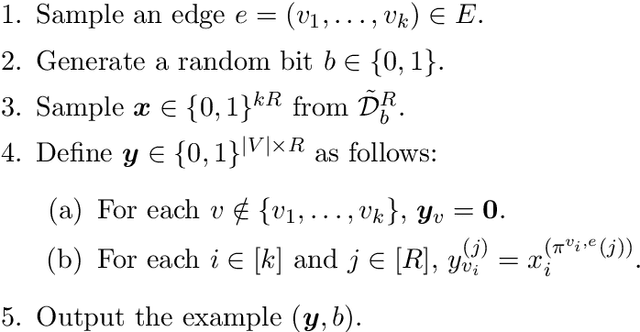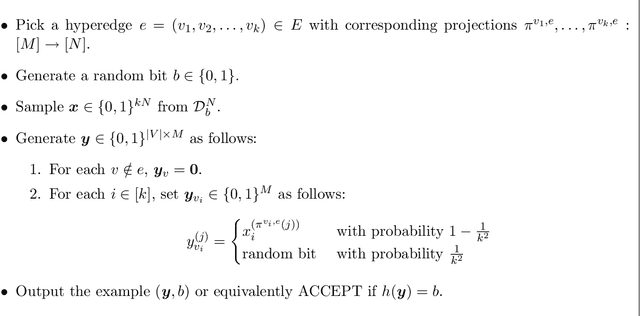Venkatesan Guruswami
Hardness of Learning Boolean Functions from Label Proportions
Mar 28, 2024Abstract:In recent years the framework of learning from label proportions (LLP) has been gaining importance in machine learning. In this setting, the training examples are aggregated into subsets or bags and only the average label per bag is available for learning an example-level predictor. This generalizes traditional PAC learning which is the special case of unit-sized bags. The computational learning aspects of LLP were studied in recent works (Saket, NeurIPS'21; Saket, NeurIPS'22) which showed algorithms and hardness for learning halfspaces in the LLP setting. In this work we focus on the intractability of LLP learning Boolean functions. Our first result shows that given a collection of bags of size at most $2$ which are consistent with an OR function, it is NP-hard to find a CNF of constantly many clauses which satisfies any constant-fraction of the bags. This is in contrast with the work of (Saket, NeurIPS'21) which gave a $(2/5)$-approximation for learning ORs using a halfspace. Thus, our result provides a separation between constant clause CNFs and halfspaces as hypotheses for LLP learning ORs. Next, we prove the hardness of satisfying more than $1/2 + o(1)$ fraction of such bags using a $t$-DNF (i.e. DNF where each term has $\leq t$ literals) for any constant $t$. In usual PAC learning such a hardness was known (Khot-Saket, FOCS'08) only for learning noisy ORs. We also study the learnability of parities and show that it is NP-hard to satisfy more than $(q/2^{q-1} + o(1))$-fraction of $q$-sized bags which are consistent with a parity using a parity, while a random parity based algorithm achieves a $(1/2^{q-2})$-approximation.
Outlier Robust Multivariate Polynomial Regression
Mar 14, 2024



Abstract:We study the problem of robust multivariate polynomial regression: let $p\colon\mathbb{R}^n\to\mathbb{R}$ be an unknown $n$-variate polynomial of degree at most $d$ in each variable. We are given as input a set of random samples $(\mathbf{x}_i,y_i) \in [-1,1]^n \times \mathbb{R}$ that are noisy versions of $(\mathbf{x}_i,p(\mathbf{x}_i))$. More precisely, each $\mathbf{x}_i$ is sampled independently from some distribution $\chi$ on $[-1,1]^n$, and for each $i$ independently, $y_i$ is arbitrary (i.e., an outlier) with probability at most $\rho < 1/2$, and otherwise satisfies $|y_i-p(\mathbf{x}_i)|\leq\sigma$. The goal is to output a polynomial $\hat{p}$, of degree at most $d$ in each variable, within an $\ell_\infty$-distance of at most $O(\sigma)$ from $p$. Kane, Karmalkar, and Price [FOCS'17] solved this problem for $n=1$. We generalize their results to the $n$-variate setting, showing an algorithm that achieves a sample complexity of $O_n(d^n\log d)$, where the hidden constant depends on $n$, if $\chi$ is the $n$-dimensional Chebyshev distribution. The sample complexity is $O_n(d^{2n}\log d)$, if the samples are drawn from the uniform distribution instead. The approximation error is guaranteed to be at most $O(\sigma)$, and the run-time depends on $\log(1/\sigma)$. In the setting where each $\mathbf{x}_i$ and $y_i$ are known up to $N$ bits of precision, the run-time's dependence on $N$ is linear. We also show that our sample complexities are optimal in terms of $d^n$. Furthermore, we show that it is possible to have the run-time be independent of $1/\sigma$, at the cost of a higher sample complexity.
Agnostic Learning of Monomials by Halfspaces is Hard
Dec 03, 2010

Abstract:We prove the following strong hardness result for learning: Given a distribution of labeled examples from the hypercube such that there exists a monomial consistent with $(1-\eps)$ of the examples, it is NP-hard to find a halfspace that is correct on $(1/2+\eps)$ of the examples, for arbitrary constants $\eps > 0$. In learning theory terms, weak agnostic learning of monomials is hard, even if one is allowed to output a hypothesis from the much bigger concept class of halfspaces. This hardness result subsumes a long line of previous results, including two recent hardness results for the proper learning of monomials and halfspaces. As an immediate corollary of our result we show that weak agnostic learning of decision lists is NP-hard. Our techniques are quite different from previous hardness proofs for learning. We define distributions on positive and negative examples for monomials whose first few moments match. We use the invariance principle to argue that regular halfspaces (all of whose coefficients have small absolute value relative to the total $\ell_2$ norm) cannot distinguish between distributions whose first few moments match. For highly non-regular subspaces, we use a structural lemma from recent work on fooling halfspaces to argue that they are ``junta-like'' and one can zero out all but the top few coefficients without affecting the performance of the halfspace. The top few coefficients form the natural list decoding of a halfspace in the context of dictatorship tests/Label Cover reductions. We note that unlike previous invariance principle based proofs which are only known to give Unique-Games hardness, we are able to reduce from a version of Label Cover problem that is known to be NP-hard. This has inspired follow-up work on bypassing the Unique Games conjecture in some optimal geometric inapproximability results.
 Add to Chrome
Add to Chrome Add to Firefox
Add to Firefox Add to Edge
Add to Edge